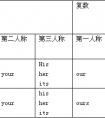There was going to ___ a struggle between her two friends. She doesn't know __ to deal with it.[ ]A. be, how B. has, what C. be, whatD. have, how-九年级英语
There appears to have been a nasty accident.似乎发生了一起严重事故。
4.there be 结构中除可以用be 外,还可以用其它动词。例如:
There came a scent of lime-blossom.飘来一阵菩提树的花香。
Once upon a time there lived a king in China.从前中国有一个国王。
There be 结构的非谓语动词形式是there to be 和there being 两种形式。在句中作主语、宾语和状语。
1. there being 结构起名词的作用,直接位于句首作主语,通常用it 作形式主语,并且用for引导。
There being a bus stop near my house is a great advantage.我家旁边有个公共汽车站,很是方便。
It is impossible for there to be any more.不可能再有了。
2. there be 结构作宾语时,通常用there to be ,常作这样一些词的宾语:
expect,like, mean, intend, want,prefer,hate等。
I expect there to be no argument about this.我期望关于这件事不要再争吵了。
I should prefer there to be no discussion of my private affairs.我宁愿不要讨论我的私事。
People don’t want there to be another war.人们不希望再有战争了。
另外,作介词宾语时,如果是介词for,只能用“there to be”其它介词用“there being”
The teacher was waiting for there to be complete silence.老师在等着大家都安静下来。
I never dreamed of there being any good chance for me.我做梦也没想到我会有好机会。
3. 作状语的there be 形式,通常用“there being”结构。
There being nothing else to do ,we went home.因为没有其他事可做,我们就回家了。
They closed the door ,there being no customers.因为没有顾客,他们的店关门了。
考点名称:宾语从句
- 宾语从句:
在句子中起宾语作用的从句叫做宾语从句。
宾语从句分为三类:动词的宾语从句,介词的宾语从句和形容词的宾语从句。
宾语从句连接代词主要有:
who, whom ,whose ,what ,whoever ,whomever ,whosever, whatever, whichever 等。 宾语从句的特点:
1.宾语从句可以作及物动词、介词及形容词的宾语。
2.宾语从句的语序一律用陈述句语序。
3.连接词that引导宾语从句在句中无词义,不充当句子成份,多数情况下可以省略。
4.whether 和 if 都可引导宾语从句,但 whether后可紧跟or not;whether从句可作介词的宾语。
5.如果从句太长,可以用形式宾语it.宾语从句的时态:
1.主句是一般现在时,从句根据实际情况使用任何时态。
例句:The headmaster hopes everything goes well.
2.主句是过去时态,从句须用过去时态的某种形式。
例句:She was sorry that she hadn’t finished her work on time.
3.当宾语从句表示的是一个客观真理或者事实时,即使主句是过去时,从句也用一般现在时态。
例句:The teacher told his class that light travels faster than sound.
4. 如果从句的动作发生在主句之前,则从句要用过去完成时态。
宾语从句的语序:
A. 宾语从句必须用陈述语序。
False: He is wondering when can he finish this difficult job.
Right: He is wondering when he can finish this difficult job.
B. 有时候可以用it 作形式宾语,而把真正的宾语从句放在后面。
Bad: I thought that he could finish this job in just two hours impossible.
Good: I thought it impossible that he could finish this job in just two hours.
C. 带有宾语从句的复合句的否定形式一般是否定主句。
Bad: I think he doesn’t like the English teacher.
Good: I don’t think he likes the English teacher.
D. 主句一般过去时态,从句也要用过去时态。
False: He wanted to know why he is crying in the corner.
Right: He wanted to know why he was crying in the corner宾语从句的否定转移:
主句的谓语动词是think,believe,imagine,suppose,consider,espect,fancy,guess等。
并且主句的主语是第一人称而且为一般现在时,从句的否定词一般要转移到主句上来,其反义疑问句一般与宾语从句一致。
I don’t think he will come to my party.而不能说成I think he won’t come to my party.
我认为他不会来我的舞会.
I don’t believe that man is killed by Jim,is he?
我认为那个人不是Jim所杀的,是不是?
如果宾语从句中有某个含有否定意义的形容词或副词,其反义疑问句要用肯定形式。
We find that he never listens to the teacher carefully,does he?
我们发现他从来不仔细听老师讲课,是不是?宾语从句中引导词的用法比较
在复合句中作主句的宾语,引导词有:
连词:that (that 常可省略),whether, if
代词:who, whose, what ,which
副词:when ,where, how, why 等。
(一)that引导的宾语从句(在非正式场合that可以省略)
1.可跟that从句做宾语的动词有:
say, think, insist, wish, hope, demand, imagine, wonder, know, suppose, see, believe, agree, admit, deny, expect, explain, order, command, feel, dream, suggest, hear, mean, notice, prefer, request, require, propose, declare, report等。
例句:The boy believes that he will travel through space to other planets.
注意事项:当主句谓语动词是 think, believe, suppose, expect 等词,而宾语从句的意思是否定时,常把否定转移至主句表示。
例句:I don’t think it is right for him to treat you like that.
2.在以下情况中that不能省略
a.当句中的动词后接多于两个由that引导的宾语从句时,第一个that可省,但后面的that不可省。
例句:He said (that) you were too young to understand the matter and that he was asked not to tell you.
b.当主句的谓语动词与that宾语从句之间有插入语时,that一般不可省。
例句:Just then I noticed, for the first time, that our master was wearing his fine green coat and his black silk cap.
c.当that从句是双宾语中的直接宾语时,that不可省。
例句:I can’t tell him that his mother died.
d.注:许多带复合宾语的句子,that引导的宾语从句经常移到句子后部,而用it作形式宾语。
例句:I find it necessary that we should do the homework on time.
(二)由whether,if 引导的宾语从句
1.由whether(if)引导的宾语从句,实际上是一般疑问句演变而来的。意思是“是否”。宾语从句要用陈述句语序。
一般说来,在宾语从句中whether与if可以互换使用,但在特殊情况下if与whether是不能互换的。
例句:I wonder whether(if) they will come to our party.
2.只能用whether,不能用if引导的宾语从句
a.在带to的不定式前
例句:We decided whether to walk there.
b.在介词的后面
例句:I’m thinking of whether we should go to see the film.
c.在动词后面的宾语从句时
例句:We discussed whether we had a sports meeting next week
d.直接与or not连用时
例句:I can’t say whether or not thet can come on time.
3.只能用if不能用whether引导的宾语从句
a.if引导条件状语从句,意为“如果”
例句:The students will go on a picnic if it is sunny.
b.if引导否定概念的宾语从句时
例句:He asked if I didn’t come to school yesterday.
c.引导状语从句even if(即使)和as if(好象)时
例句:He talks as if he has known all about it.if,whether在宾语从句中的区别
a.if和whether在作“是否”解时,引导宾语从句常放在动词know,ask,care,wonder,find out等之后,介词后一般不用if
b.少数动词,如:leave,put,discuss,doubt后的宾语从句常用whether.
c. whether后可以加or not,但是if不可以.
d.在不定式前只能用whether.
(如:I can’t decide whether to stay. 我不能决定是否留下。)
e.避免歧异时,我们常用whether而不用if.
(三)连接代词和连接副词引导的宾语从句
这样的宾语从句实际上是由特殊疑问句变化而来的,宾语从句要用陈述句语序。
用于这种结构的动词常常是:see, say, tell, ask, answer, know, decide, show, find out, imagine, suggest, doubt, wonder, discover, understand, inform, advise等。
1.英语中的连接代词有:who,whom,whose,which,what,在句中担任主语、宾语、定语或者表语。
例句:Can you tell me whom you are waiting for?
2.英语中的连接副词有:when,where,why,how,在句中担任状语的成分。
例句:None of us knows where these new parts can be bought.简化宾语从句常用六法:
方法一:
当主句谓语动词是hope, decide, wish, choose, agree, promise等,
且宾语从句的主语与主句主语一致时,宾语从句可简化为不定式结构。
例如:
Li Ming hopes he will be back very soon.
- 最新内容
- 相关内容
- 网友推荐
- 图文推荐
| [家长教育] 孩子为什么会和父母感情疏离? (2019-07-14) |
| [教师分享] 给远方姐姐的一封信 (2018-11-07) |
| [教师分享] 伸缩门 (2018-11-07) |
| [教师分享] 回家乡 (2018-11-07) |
| [教师分享] 是风味也是人间 (2018-11-07) |
| [教师分享] 一句格言的启示 (2018-11-07) |
| [教师分享] 无规矩不成方圆 (2018-11-07) |
| [教师分享] 第十届全国教育名家论坛有感(二) (2018-11-07) |
| [教师分享] 贪玩的小狗 (2018-11-07) |
| [教师分享] 未命名文章 (2018-11-07) |

![—I want to know if ______ a concert in our school hall this weekend. —Yes. Nancy told me about it. [ ]A. there will have B. there will be C. will there be -九年级英语](http://www.00-edu.com/d/file/ks/4/2/there be juxing/2020-02-28/small8bcf29e494d6f99c2d7c4286c4836a101582899344.jpg)
![There_____ a potato and two tomatoes on the table. [ ]A. isB. areC. hasD. have-七年级英语](http://www.00-edu.com/d/file/ks/4/2/there be juxing/2020-02-28/small596b7df57071a5318d44b4246a8dfcf71582899941.jpg)

![Will there___any schools in the future?[ ]A. isB. areC. amD. be-七年级英语](http://www.00-edu.com/d/file/ks/4/2/there be juxing/2020-02-28/smallfaad594ad286847556f8b2a7bf4e6da41582899915.jpg)
![There is going to _____English movie tonight. [ ]A. be B. be an C. have D. have an -八年级英语](http://www.00-edu.com/d/file/ks/4/2/there be juxing/2020-02-28/small684c03bf16377c6f94e9f828954421a91582899285.jpg)
